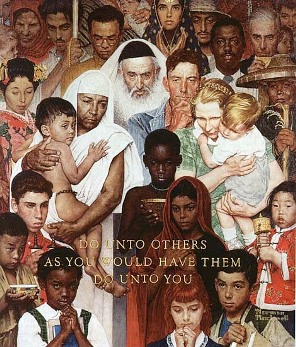In 1916, at the tender age of 22, Norman Rockwell submitted his first successful cover to the Saturday Evening Post – a magazine that became an essential in homes and business waiting rooms across America. Over the next 47 years, the illustrator produced another 321 original covers for the Post.

Of course, what Rockwell succeeded at most was depicting America in a kind of idyllic, small-town splendor; a place where citizens were upright, decent and loyal; where they are free to speak their mind, worship as they choose, and unite around a Thanksgiving in genuine harmony.
Rockwell said that he frequently chose people from New England for his models because “…[their] character is strong and unshakable.” He thought of his paintings as “independent storytelling pictures.” They are indeed. The Spirit of Americashows a Boy Scout set against past images that symbolize the diversity and character of the nation.
Of course, what speaks clearly to me are the ethical issues he illustrates. The Problem We Live With shows us the face of civil rights.

The Golden Rule reminds us of how we should treat each other regardless of age, race or religion.

While playing to a sentimental moment in time when things seemed innocent, honest and good, Rockwell’s America actually lived through turbulent times – three wars, a Great Depression, Civil Rights, and multiple political assassinations. In examining the whole of his work, Norman Rockwell doesn’t always show us the way we are, but rather, the way we ought to be. The vast majority of painted illustrations generally favor a hopeful America, a country that aspires to be better than its problems.
The same can be said of ethics.
“Ethics is not about the way things are,” ethicist Michael Josephson writes. “It’s about the way things ought to be.”
Most of us strive to live out of a core set of ethical values. It’s not always easy – particularly when times are tough – and sometimes we fail, but we’ve come through hard times before, and we can come through them again, if we remember who we are and what we stand for – honesty, loyalty, responsibility, respect, fairness, compassion and citizenship – the same “strong and unshakable” values expressed in Rockwell’s America.
Comments









